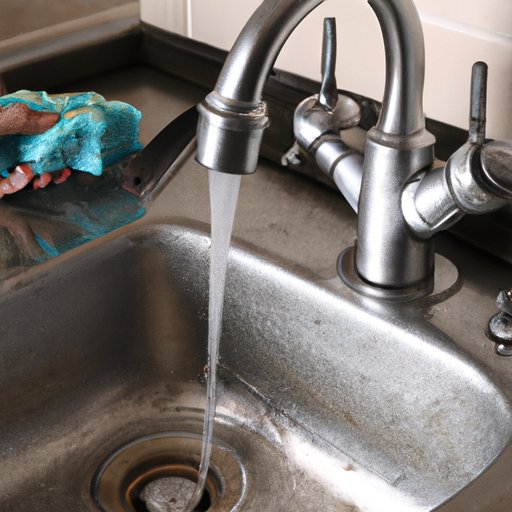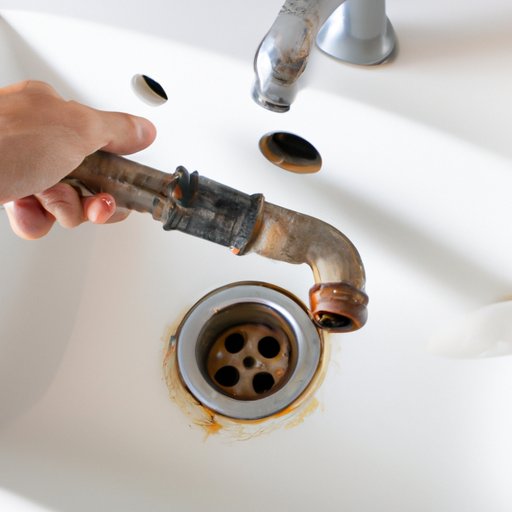I. Introduction
Have you ever been washing dishes or brushing your teeth, only to have the sink refuse to drain? Sink clogs are a common household problem that can be caused by a variety of factors, from hair to food particles, grease, and mineral buildup. Knowing how to unclog a sink is an essential skill for any homeowner, as it saves money and time, keeps sinks functioning properly, and prevents plumbing issues from escalating.

II. Quick and Easy Methods for Unclogging Sinks
If a sink is clogged, there are several quick and straightforward methods to try before calling in a professional.
A. Plunger
A plunger is an excellent tool for unclogging a sink, provided that you use the correct technique. To plunge a sink, first, fill the sink with enough water to cover the plunger’s rubber cup. Seal the plunger over the drain, and pump the plunger up and down quickly. The suction and pressure will help dislodge the clog. Repeat this process until the water drains away freely.
B. Boiling Water
If a plunger is not available, try pouring boiling water down the drain. Boiling water can break up grease and clear out minor clogs. However, be cautious when using boiling water, especially in older plumbing systems, as it can weaken or melt PVC pipes.
C. Baking Soda and Vinegar
A baking soda and vinegar solution is a safe, natural way to unclog a sink. Simply mix a cup of baking soda and a cup of vinegar, and pour the mixture down the drain. Let it sit for about ten minutes before rinsing with boiling water.
D. Drain Snakes
If a sink clog is more stubborn, you may need a drain snake to clear it. A drain snake is a flexible tool that can reach down the drain and dislodge clogs. To use a drain snake, push it down the drain and twist it until you hit the obstruction. Then, pull it back up to clear away the blockage.
III. DIY Plumbing: How to Unclog Your Sink with Everyday Household Items
If you prefer to use household items to unclog your sink, here are a few DIY plumbing tricks:
A. Wire Hangers
Straighten a wire hanger, and use the hook end to clear away clogs. Bend the wire hanger to fit through the pipe and then use it to scrape out the clog. Avoid using this method if you have plastic pipes, as it can scratch or damage the pipes.
B. Dish Soap
Boil a pot of water, pour in a quarter cup of dish soap, and then pour the mixture down the sink. The dish soap will lubricate and loosen the clog, while hot water helps flush it away.
C. Wet/Dry Vacuum
For heavy-duty clogs, use a wet/dry vacuum. Place the vacuum hose over the drain, seal it tightly with a cloth, and switch on the vacuum. The suction can draw out the blockage, but be careful not to use too much force or suck up items that should not be there.
IV. The Benefits of Hiring a Professional Plumber to Unclog Your Sink
While DIY methods are useful, some sink clogs require the expertise of a professional plumber.
A. Saving Time
Instead of trying various methods and hoping to hit upon the right one, hiring a plumber can save time and effort. A plumber can diagnose the problem quickly and select the best solution for the job.
B. Ensuring Safety
Using harsh chemicals or inappropriate tools can damage pipes, leading to more extensive and expensive plumbing damage. A plumber has the requisite knowledge and expertise to ensure that the problem is resolved safely and efficiently.
C. Preventing More Serious Plumbing Issues
While a clogged drain may seem like a minor problem, it can be a warning of more severe plumbing issues such as damaged pipes that require replacement. A plumber can identify these issues before they become more expensive problems.
V. Old vs. New Plumbing: How to Unclog Sinks in Older Homes
Older homes often have plumbing systems that differ from modern ones, and you may need to modify your approach to unclogging sinks.
A. Tips and Tricks for Older Homes and Plumbing Systems
In older homes, sink clogs are typically not caused by hair or food particles, but by mineral buildup, rust, or deteriorated pipes. Use commercial drain cleaners and baking soda and vinegar solutions sparingly, as they can corrode old pipes. Instead, use a plunger or a drain snake to break up clogs in older plumbing systems.
B. Common Issues with Older Plumbing
Older plumbing may not be designed to handle modern waste products such as garbage disposals, baby wipes, or feminine hygiene products. Make sure that only appropriate items are disposed of in the sink, and consider upgrading your plumbing system if necessary.
VI. How to Prevent Sink Clogs In The First Place
Prevention is key when it comes to sink clogs. Here are some tips to prevent clogs from forming in the first place:
A. Using a Sink Strainer
Install a sink strainer to trap hair, food particles, and other debris before it enters your drain system.
B. Not Pouring Grease Down The Drain
Grease can solidify in pipes and trap other debris, leading to clogs. Instead of pouring grease down the sink, dispose of it in the trash, or save it for reuse in cooking.
C. Regular Inspections of Your Plumbing System
Frequent plumbing inspections can detect small problems before they become significant, help maintain pipes, and prevent clogs.
VII. How Environmental Factors Impact Sink Clogs
The environment affects plumbing systems, and some areas may experience more frequent sink clogs due to several factors.
A. Climate
Climate can impact the performance of pipes. For example, frozen pipes can crack and burst, causing clogs. In humid environments, mold and mildew growth in pipes can cause clogs.
B. Water Quality
Hard water causes mineral buildup in pipes, leading to blockages over time. Softening water, installing filters, or investing in water treatment systems can prevent clogs.
C. Counteracting Environmental Factors
Homeowners can combat environmental factors by taking preventative measures, such as installing insulation during colder weather, and using water softeners to reduce mineral buildup. Regular plumbing inspections can also detect and resolve issues caused by environmental factors.
VIII. 10 Common Mistakes Homeowners Make When Trying to Unclog Sinks
Here are ten common mistakes homeowners make when trying to unclog sinks and how to avoid them:
A. Using Too Much Force
Applying too much force when plunging or using a drain snake can damage pipes.
B. Flushing the Wrong Items
Flushing inappropriate items, such as baby wipes or sanitary towels, down the drain can cause clogs.
C. Delaying Action When a Clog Begins to Form
Ignoring the initial signs of a clogged sink can lead to more severe clogging and damage to pipes.
D. Pouring Chemicals Down The Drain
Harsh chemicals can erode and damage pipes, leading to further plumbing problems.
E. Using Incorrect Plumbing Tools
Using an incorrect drain snake or plunger can damage pipes or worsen a clog.
F. Pouring Grease Down The Drain
Grease hardens in the pipes and traps other debris, causing clogs.
G. Not Using Sink Strainers
Without sink strainers, hair and food particles can enter the drain, causing clogs.
H. Not Adjusting Plumbing Methods for Older Homes
Older plumbing methods differ from modern ones, requiring different approaches when unclogging sinks.
I. Not Regularly Inspecting Plumbing Systems
Frequent plumbing inspections can detect small problems before they become significant and prevent clogs.
J. Choosing to DIY When a Professional is Necessary
Some sink clogs require professional plumbing assistance, and attempting to DIY may worsen the problem or cause more extensive damage to pipes.
IX. Conclusion
Unclogging a sink is a fundamental home maintenance skill that every homeowner should possess. From quick and easy methods to household DIY tricks, there are several ways to clear away clogs. If you are unsure or unable to unclog your sink, a professional plumber can diagnose and fix the problem quickly and efficiently. Regular plumbing inspections and preventative measures can prevent sink clogs from forming in the first place.
By incorporating these methods and maintaining pipes, homeowners can save time, money, and prevent more severe plumbing issues from developing.
A. Recap of Topics
In the article, we covered the importance of knowing how to unclog sinks, quick and DIY methods for unclogging sinks, the benefits of hiring a professional plumber, how to prevent clogs in the first place, how environmental factors impact sink clogs, common mistakes homeowners make when trying to unclog sink, and old vs. new plumbing.
B. Call to Action
Practice preventative plumbing measures such as installing sink strainers, avoiding pouring grease down the drain, and scheduling regular plumbing inspections to maintain healthy pipes.
C. Final Thoughts
By combining quick and straightforward methods with preventative maintenance, homeowners can ensure their plumbing systems stay working correctly and trouble-free.
